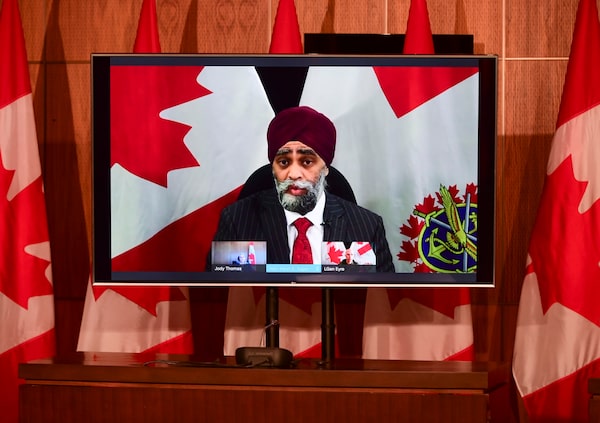
Minister of National Defence Harjit Sajjan takes part in a press conference via video link in Ottawa on March 24, 2021.Sean Kilpatrick/The Canadian Press
A top civil servant contradicted Defence Minister Harjit Sajjan’s denial of any role in awarding former chief of defence staff Jonathan Vance a pay raise after the Prime Minister’s Office and Mr. Sajjan were made aware of sexual misconduct allegations against him.
Janine Sherman, who as a deputy secretary to the cabinet is one of the most senior civil servants in the federal government, appeared at the House of Commons defence committee Friday. Citing privacy rules, she declined to answer many questions about the allegations and the government’s response, prompting an NDP MP to compare her responses to a “culture of denial and deflection” within the public service.
However, she told the committee that Mr. Sajjan was involved in Mr. Vance’s annual performance review, which underpinned the former top soldier’s 2018 pay raise.
“The minister is consulted in the annual performance management program in respect of [governor in council] appointees within his portfolio,” Ms. Sherman told the committee. “Those annual reviews are the basis for salary adjustments.”
At a March 12 committee meeting, Mr. Sajjan told the defence committee: “I’m not involved in any of the performance pay. It has nothing to do with cabinet.”
Conservative MP Bob Benzen asked him: “Would there be a review done before he was given a raise?”
To which Mr. Sajjan replied: “I would not know because I’m not part of that process.”
Ms. Sherman said neither she nor the minister makes a decision on pay on their own. Rather, she said, her role is to advise on what pay should be, and ultimately cabinet makes the decision to approve a change in salary.
The Globe and Mail reported on Monday that Prime Minister Justin Trudeau approved a bonus for Mr. Vance even after his office was made aware of an allegation against him.
Global News first reported Mr. Vance is facing accusations of inappropriate behaviour with two female subordinates while he was head of the Canadian Armed Forces. Mr. Vance has denied any wrongdoing. That reporting sparked the defence committee’s study into sexual misconduct in the military.
Mr. Trudeau and Mr. Sajjan have come under intense scrutiny for their role in the handling of the 2018 allegations against Mr. Vance.
The allegations did not lead to a full investigation and despite being responsible for the top commander of the Canadian Forces, Mr. Sajjan has insisted he could not have done more to ensure Mr. Vance was investigated because as a politician he can’t be involved in investigations.
Former defence ombudsman Gary Walbourne told the committee on March 3 that he informed Mr. Sajjan about an informal complaint against Mr. Vance and the minister refused to look at the evidence. Mr. Walbourne reports to the minister and said he was seeking advice on how to proceed.
Members of Parliament on the defence committee tried to get a clearer understanding Friday of what Mr. Trudeau and Mr. Sajjan did when the allegations were raised in 2018 and who else was involved. Mr. Trudeau has confirmed that his office was aware in 2018 that Mr. Walbourne told Mr. Sajjan about a complaint involving Mr. Vance but Mr. Trudeau has not answered questions on whether he was briefed directly on the matter.
Ms. Sherman said she couldn’t answer many questions citing cabinet confidence and the privacy concerns of publicly paid senior political staff and Mr. Vance.
“I cannot speak to the specific information about General Vance. That would be personal information,” she said when asked whether she knew about a previous 2015 allegation against him.
Ms. Sherman declined to say with whom she spoke in the Prime Minister’s Office and minister’s office. She also declined to say whether Mr. Trudeau or Mr. Sajjan asked her to do more follow-up or take any other action after she told the clerk of the Privy Council that she didn’t have enough information to proceed with an investigation.
“I would not be in a position to respond to that in terms of the confidence of advice and further discussions internally,” Ms. Sherman said in response to questions from NDP MP Randall Garrison.
Mr. Garrison told Ms. Sherman that he had no intent to “impugn your integrity or your record of public service.”
“But I do think what your testimony reveals today is a parallel to the culture of denial and deflection in the Canadian Armed Forces,” he said. “The parallel here seems to be that the privacy of the accused seems to be much more important than responding effectively to the complaints of sexual misconduct.”
Know what is happening in the halls of power with the day’s top political headlines and commentary as selected by Globe editors (subscribers only). Sign up today.